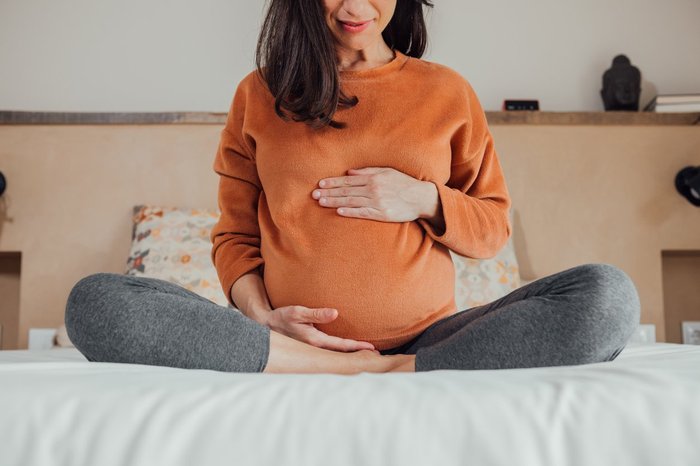Having chronic kidney disease (CKD) can affect the health of women who are pregnant. It can also affect the health of their babies.
How will chronic kidney disease affect me during pregnancy?
The combined impact of CKD and pregnancy on your health can be predicted by a blood test. This test measures creatinine, which can indicate how well your kidneys are working. The level of creatinine in your blood is taken together with your age and ethnicity, and sometimes your height and weight, to calculate your estimated glomerular filtration rate (eGFR).
The higher the eGFR, the better your kidneys are working and the better the chance of a successful and uncomplicated pregnancy.
There are three main risks that can occur in pregnancy if you have CKD:
- Developing high blood pressure. This can happen at any stage of the pregnancy and is a consequence of CKD.
- Developing pre-eclampsia. CKD increases the risk of pre-eclampsia. This is a serious illness that usually happens in the second half of pregnancy. It causes high blood pressure and protein in the urine. The symptoms of pre-eclampsia may include headaches, blurred vision or swelling of the hands, feet, or face. Your antenatal clinic will measure your blood pressure and test your urine for protein. This helps pick up pre-eclampsia early.
- Worsening of kidney function. In general, the better your kidney function at the start of the pregnancy, the less likely it is to get worse later.
What can be done to protect me during pregnancy?
Good antenatal care from the earliest stages of pregnancy generally improves outcomes. This is particularly true if you have CKD. Planning for pregnancy allows you to get pregnant at the right time, while on the right medications and in the best possible health.

Should I get pregnant at all?
There are very few women these days who are advised not to get pregnant. Even then it is always up to you (and your partner) whether to take the risk. It is much better to know about the possible problems and to discuss these in advance.
When should I get pregnant?
This depends on the nature of your kidney disease. In general, if your kidney function is likely to get worse over time it is better to plan for pregnancy sooner rather than later while your function is still good. On the other hand, if you have a kidney disease that flares up and then settles down, such as lupus nephritis, it is better to wait until the flare has settled for at least six months.
Your age will also affect your fertility, as can some treatments for kidney conditions. You can talk to your kidney doctor about whether you may need support to get pregnant.
Are any extra medicines needed during pregnancy?
All women trying to get pregnant should take the vitamin folic acid for at least 3 months to reduce the chance of their baby having spina bifida, a problem with the spinal cord. Folic acid can be bought over the counter from local pharmacies. Some kidney medications can affect how folic acid work so you should check with your doctor or midwife who will be able to advise you on the correct dosage for your situation.
Vitamin D is generally recommended for all pregnant women, to help strengthen your baby's bones. You do not need any other supplements unless advised by your doctor.
Women with kidney disease are at higher risk of pre-eclampsia. Aspirin lowers this risk check with your doctor if they would recommend this for you.
Pregnant women who have a high level of protein in their urine have an increased risk of developing blood clots (thrombosis). This risk can be reduced by small daily injections of heparin, which makes the blood less likely to clot.
Both pregnancy and CKD on their own can cause a low blood count (anaemia), and the risk is higher if a pregnant woman has CKD. You may need to take iron tablets or have iron injections, and sometimes weekly or monthly injections of the hormone erythropoietin (EPO). EPO can increase your blood pressure so this will need to be monitored carefully by your doctor. Blood transfusions are usually avoided in pregnancy.
Pregnancy alters the body's control of sugar (glucose). This may be worse if you are being treated with steroids (e.g. prednisolone), from an Asian or African background, or are overweight. You may develop a condition called gestational diabetes (diabetes caused by pregnancy) and need treatment with insulin.
How does CKD affect the baby during pregnancy?
There are two main problems that can affect the baby:
- Your baby may not grow properly in the womb. This may mean that your baby will be smaller when it is born than if you did not have kidney disease. It can lead to long-term health problems for the baby and in extreme cases the baby may not survive.
- Your baby is more likely to be born before their due date. A baby born before 37 weeks is called premature and is more likely to have medical problems when they are born. The severity of these problems will depend on how early the baby is born and how much they weigh.

How can I protect my baby during pregnancy?
Your doctor can monitor your baby's growth using an ultrasound scan. If your baby is growing well, you can expect to deliver normally at your due date.
If your baby stops growing as much as your doctor would like, they will discuss with you about the best next steps. This may include delivering your baby early.
Will my medication harm my baby?
There are some medicines used in CKD which have to be avoided in pregnancy because they could harm your baby. It is therefore important to check with your doctor before you try to get pregnant.
Do not stop your medications without taking medical advice!
Will my baby get kidney disease?
This depends on the type of kidney disease you have. Check with your doctor whether your condition is likely to be passed on to your child.
Will I have to have my baby in a special unit?
If you have mild CKD, are in generally good health, and have well-controlled blood pressure, you can remain under the care of your usual kidney doctor and local hospital.
If you have more severe CKD or a kidney transplant you will likely need to be cared for by a specialist unit.
Home births are not recommended if you have CKD as you are more likely to need specialist, hospital-based care.
Is breastfeeding safe if I have CKD?
In general, yes but it is important to check with your doctor as some drugs pass into breast milk and may harm your baby.
Where can I find out more information about pregnancy and CKD?
Talk to your doctor if you are thinking of trying for a baby, as they can give you personalised advice that is right for your situation.
Other sources of information include RareRenal's information on pregnancy and rare kidney disease.
Pregnancy and Chronic Kidney Disease: download or order Kidney Care UK's information leaflet
You can download our Pregnancy and Chronic Kidney Disease leaflet for free.
You can also order a printed copy of Kidney Care UK’s Pregnancy and Chronic Kidney Disease leaflet to be sent to you in the post.